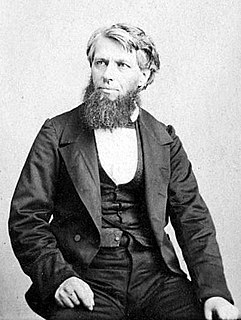A Quote by Bill Vaughan
A man's penmanship is an unfailing index of his character, moral and mental, and a criterion by which to judge his peculiarities of taste and sentiments.
Quote Topics
Related Quotes
Man's main task in life is to give birth to himself, to become what he potentially is. The most important product of his effort is his own personality. One can judge objectively to what extent a person has succeeded in his task, to what degree he has realized his potentialities. If he has failed in his task, one can recognize this failure and judge it for what it is - a moral failure.
The moral absolutes rest upon God's character. The moral commands He has given to men are an expression of His character. Men as created in His image are to live by choice on the basis of what God is. The standards of morality are determined by what conforms to His character, while those things which do not conform are immoral.
Man, no doubt, owes many other moral duties to his fellow men; such as to feed the hungry, clothe the naked, shelter the homeless, care for the sick, protect the defenseless, assist the weak, and enlighten the ignorant. But these are simply moral duties, of which each man must be his own judge, in each particular case, as to whether, and how, and how far, he can, or will perform them.
It is quite useless to declare that all men are born free if you deny that they are born good . Guarantee a man's goodness and his liberty will take care of itself. To guarantee his freedom on condition that you approve of his moral character is formally to abolish all freedom whatsoever, as every man's liberty is at the mercy of a moral indictment which any fool can trump up against everyone who violates custom, whether as a prophet or as a rascal.
We are in the society of the teacher-judge, the doctor-judge, the educator-judge, the 'social-worker'-judge; it is on them that the universal reign of the normative is based; and each individual, wherever he may find himself, subjects to it his body, his gestures, his behavior, his aptitudes, his achievements.
The mental capacity of a person to make reasonable contracts, is the only criterion, by which to determine his legal capacity to make obligatory contracts. And his mental capacity to make reasonable contracts is certainly not to be determined by the fact that he is, or is not, twenty-one years of age.
Just because a man is dressed in a clean white robe does not mean his heart and hands are clean. Any man who neglects his conscience is a dangerous animal. Never judge a man by his image. Images can be bought or produced by any Hollywood producer, marketing team or fleet of stylists. Even kids know how to wear amazing costumes for Halloween. Always judge a man by the coloring of his heart and only his heart. Truth can be found in his record of actions, not intentions.
Adam Smith's image of competition in the marketplace was intended as an adjunct to his detailed description of human motivation in The Theory of Moral Sentiments , in which the pursuit of profit is tempered at every juncture by sympathy and benevolence, and by the posture of the "impartial spectator" which is forced on us by our moral nature.
In civilized life, where the happiness, and indeed almost the existence, of man depends so much upon the opinion of his fellow-men, he is constantly acting a studied part. The bold and peculiar traits of native character are refined away or softened down by the levelling influence of what is termed good-breeding, and he practises so many petty deceptions and affects so many generous sentiments for the purposes of popularity that it is difficult to distinguish his real from his artificial character.
A human being without the proper empathy or feeling is the same as an android built so as to lack it, either by design or mistake. We mean, basically, someone who does not care about the fate which his fellow living creatures fall victim to; he stands detached, a spectator, acting out by his indifference John Donne's theorem that "No man is an island," but giving that theorem a twist: that which is a mental and a moral island is not a man.
































